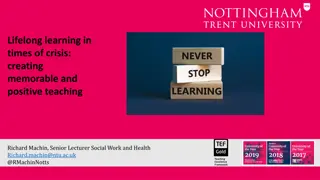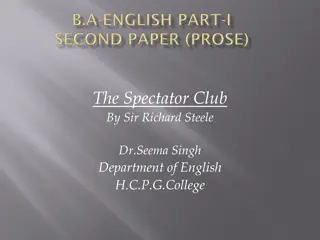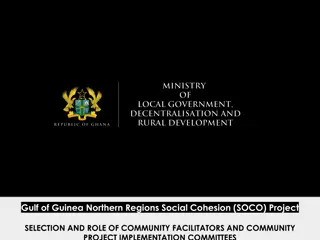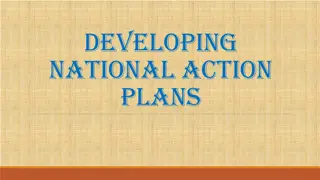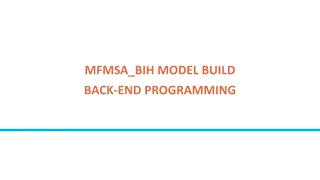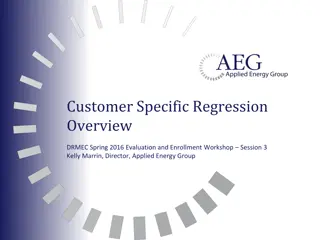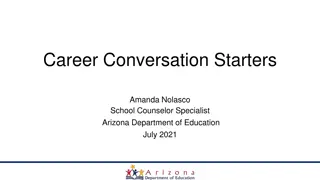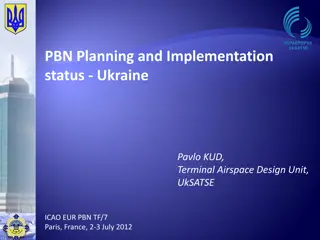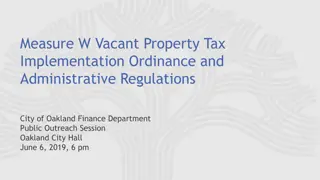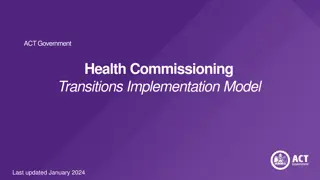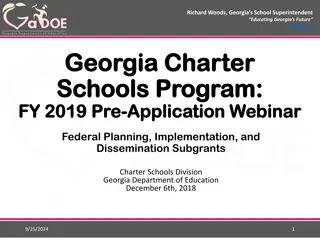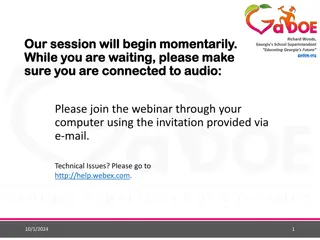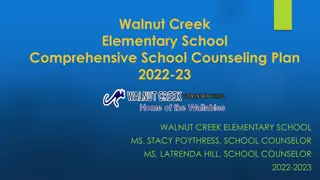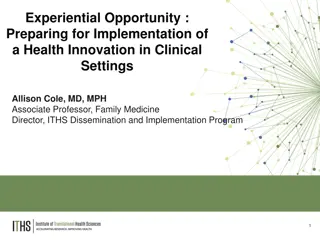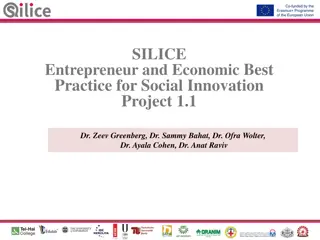Overview of ASCA National Model Implementation by Richard Tench
This overview discusses the ASCA National Model and its implementation in school counseling programs. It covers important matters such as training, credentialing, and counselor-to-student ratios. The model's purpose is to enhance student outcomes by defining, managing, delivering, and assessing comprehensive counseling programs. It emphasizes student and professional standards, mindset, behaviors for student success, and the integration of advocacy, leadership, collaboration, and systemic change.
Download Presentation

Please find below an Image/Link to download the presentation.
The content on the website is provided AS IS for your information and personal use only. It may not be sold, licensed, or shared on other websites without obtaining consent from the author. Download presentation by click this link. If you encounter any issues during the download, it is possible that the publisher has removed the file from their server.
E N D
Presentation Transcript
ASCA NATIONAL MODEL: OVERVIEW & IMPLEMENTATION Richard Tench M.A., LPC, NCC, NCSC School Counselor St. Albans High School Adjunct Faculty Marshall University ASCA Board of Directors WVDE School Counselor Conference Charleston, WV March 3, 2020
SESSION OBJECTIVES: Provide an overview of the ASCA National Model (4th edition) released at the 2019 Conference Assess where you are in terms of your readiness/willingness to implement a comprehensive school counseling program Develop goal to implement one new element of the National Model into your counseling program
IMPORTANT MATTERS Training and Credentialing Matter: School counselors are certified/licensed educators with a minimum of a master s degree in school counseling, making them uniquely qualified to address all students academic, career, and social/emotional development needs through the implementation o a school counseling program that promotes and enhances student success. (Executive Summary p.1) Ratios Matter: Research supports that appropriate ratios have a significant effect on student success; the ASCA recommended ratio is 250:1. Currently, in WV, it is 476:1.
ASCA NATIONAL MODEL (4THED.) Purpose of the Model: To assist school counselors in the design and delivery of a comprehensive school counseling program that improves student outcomes. Four Components: -Define -Manage -Deliver -Assess -Diagram on page v. -Notice how they integrate and support each other -Also, themes of Advocacy, Leadership, Collaboration, and Systemic Change are integrated into each component.
DEFINE Student Standards (Handout: ASCA Mindset & Behaviors for Student Success) Professional Standards (ASCA Ethical Standards: ASCA School Counselor Professional Standards & Competencies)
MINDSETS & BEHAVIORS FOR STUDENT SUCCESS (HANDOUT & P. 1 OF THE MODEL) Research-based Encompass Academic, Career and Social/Emotional Domains Can be applied to school, classroom, small group or individual standards Includes 2 Categories: Category 1: Mindset Standards (the attitudes or beliefs students have about themselves in relation to academic work; belief systems are exhibited as behaviors). Category 2: Behavior Standards (Visible outward signs that a student is engaged in learning). Three subcategories -Learning Strategies -Self-Management Skills -Social Skills
WV Dispositions and Standards for Student Success DSS.9-12.1 DSS.9-12.2 DSS.9-12.3 DSS.9-12.4 DSS.9-12.5 DSS.9-12.6 DSS.9-12.7 DSS.9-12.8 DSS.9-12.9 DSS.9-12.10 DSS.9-12.11 DSS.9-12.12 DSS.9-12.13 DSS.9-12.14 DSS.9-12.15 DSS.9-12.16 DSS.9-12.17 DSS.9-12.18 ASCA Mindsets & Behaviors ASCA MINDSET AND BEHAVIORS B-SS 2 B-SS 2 B-SS 5 B-SMS 5 B-SS 1 B-LS 4 B-LS 1 B-LS 6 B-LS 7 B-SMS 5 B-LS 9 B-SMS 10 B-LS 7 B-SS 5 B-SS 2 B-SS 9 B-SS 7 B-SMS 8 Not an extra .it s the work you already do!!!! Example of High School Alignment
BUT HOW DO I USE THESE? WE WILL TALK ABOUT THIS IN THE DELIVER SECTION!!!
PROFESSIONAL STANDARDS: ASCA ETHICAL STANDARDS (2016) The Ethical Standards are on page 15 of the Model. Also available in their entirety on the ASCA website (www.schoolcounselor.org) Best practice is always ethical practice Follow the STEPS (Stone, 2001) in ethical decision-making
SOLUTIONS TO ETHICAL PROBLEMS IN SCHOOLS (STEPS) (STONE 2001) 1. Define the problem emotionally and intellectually. 2. Apply the ASCA Ethical Standards for School Counselors and the law. 3. Consider the students chronological and developmental levels. 4. Consider the setting, parental rights and minors rights. 5. Apply the ethical principles of beneficence, autonomy, nonmaleficence, loyalty and justice 6. Determine possible courses of action and their consequences 7. Assess the selected action. 8. Consult 9. Implement the course of action What would a reasonable counselor do in this situation?
ASCA SCHOOL COUNSELORS PROFESSIONAL STANDARDS AND COMPETENCIES Mindsets: Beliefs that school counselor hold about student achievement and success Behaviors: Essential behaviors demonstrated through the implementation of a comprehensive school counseling program. 3 Categories: Professional Foundation, Direct and Indirect Student Services (Delivery), Planning and Assessment Pages 8-13 include specific competencies that are measurable indicators of the behavior standard. Could use these as an advocacy tool to indicate the need for more direct time with students, attendance at professional development events, etc.
MANAGE Two Areas of School Counseling Program Management Program Focus Program Planning The ASCA National Model provides school counselors with program focus and planning tools to guide the design and implementation of a data based school counseling program
PROGRAM FOCUS Beliefs: What do you believe about students and schools? Mission Statement: A mission statement provides the focus and direction to reach the vision. It creates one focus or purpose in the school counseling program (p.31). It is built on the school mission and school district mission. (More about this later!) Vision Statement: Communicates what school counselors hope for students in the next 5-15 years.
PROGRAM PLANNING School Data Summary (Where is the data? Who has access? How do you find?) [See p. 33 of Model for a good School Data Summary Template] -3 types of data: Participation, Mindsets & Behaviors, Outcome Data Participation data: Who participated? Mindsets & Behaviors data: What did students learn through participation in the school counseling activity? Outcome Data: How did the learning affect students achievement, attendance, or discipline? Examples on pp. 35-36 There should be an Annual Review of Data to create goals for the next year based on the gaps identified in the data.
PROGRAM PLANNING Annual Student Outcome Goals: Template on pp. 42-43. These can also be written as SMART goals. Good examples for Achievement, Attendance, and Discipline are on pp. 44-45 of the Model. More about goals later!
PROGRAM PLANNING Action Plans -Based on the data and the goal, develop Action Plans in two areas: (1) Closing the gap (2) Classroom and small group Mindsets and Behaviors Action Plan Lesson Plans: ASCA has a template that includes the Model components.
PROGRAM PLANNING Annual Administrative Conference (p. 58) Use of Time: ASCA recommends that no more than 20% of a school counselor s time should be spent in program planning and school support activities. (Appropriate and Inappropriate School Counselor Activities handout --- p. 3 of Executive Summary). Let s talk about it! Calendars inform students, parents, teachers and administrators of what, when and where school counseling activities will be held (annual calendar p. 70; weekly calendar p. 71) Advisory Council meets twice per year; between 8-20 members. Templates on p. 75-76. Advisory Council is an important communication tool! Templates include Agenda and Minutes documents.
DELIVER Direct Student Services Instruction (Classroom, Small Group, Large group, Individual) Appraisal and Advisement (analyze and assess student abilities, interests, skills and achievements and advise accordingly). Counseling Indirect Student Services Consultation Collaboration Referrals Great graphic on page 84 showing how and who the deliver component should serve! A minimum of 80% of a school counselor s time should be spent in direct and indirect student services.
ASSESS Why Assess? To determine program s effectiveness To inform improvements to the school counseling program design and delivery To show how students are different as a result of the school counseling program.
ASSESS Program Assessment -School Counseling Program Assessment -Annual Results Reports (CTG + M & B) School Counselor Assessment and Appraisal -ASCA School Counselor Professional Standards & Competencies Assessment -School Counselor Performance Appraisal Template
STUDENT OUTCOME GOAL DEVELOPMENT Align with the district goals? Based on school data Should address achievement, attendance, or behavior improvement Follow template Choose just one!!!
THE BOTTOM LINE.. You can do what you ve always done .and things won t change Focus on implementing or trying just one thing (Advisory Council, Admin Agreement, one school goal, mission statement for your program) Use Your Data (Data is the greatest source of needs assessment) Continue to grow in efficacy (both as a professional and in your SC program)
QUESTIONS? Richard Tench M.A., LPC, NCC, NCSC rtench@mail.kana.k12.wv.us 304-722-0212 x105










